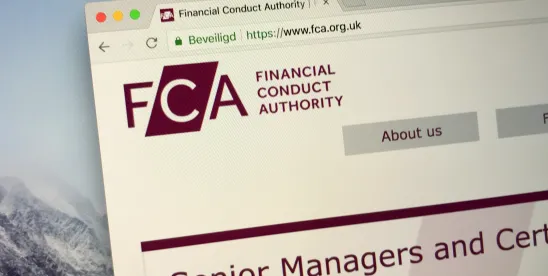The Financial Conduct Authority (the “FCA”) recently published its Policy Statement and Consultation on non‑financial misconduct (“CP25/18”). The FCA confirms in CP25/18 that its rules are being updated to better capture non‑financial misconduct (“NFM”) in recognition that serious misconduct such as bullying, harassment and violence is a matter of regulatory concern. This already applied to banks, but from 1 September 2026 will also apply to non-banking firms.
What are the aims of the new NFM rule?
The FCA sets out that its aims in the new NFM rule are to:
- give firms confidence to take robust action against serious misconduct;
- drive consistency across the financial sector; and
- make it clearer when NFM is a breach of an FCA rule.
This is part of the FCA’s Strategy for 2025 – 2030 to promote healthy and inclusive workplace cultures and to deepen trust in financial services.
What does the new NFM rule cover?
The new rule in the FCA Code of Conduct (“COCON”) covers the following NFM:
- conduct that has the purpose or effect of
- violating the individual’s dignity; or
- creating an intimidating, hostile, degrading, humiliating or offensive environment for the individual; or
- conduct that is violent to the individual.
The “individual” in receipt of the unwanted conduct is not limited to direct colleagues but could also include other group members or personnel that are providing services to the firm.
Which firms are in scope of the new NFM rule?
The new rule applies to all firms with a Part 4A permission under the Financial Services and Markets Act 2000 and staff in those firms who are subject to COCON. This would therefore include individuals at firms with permissions to carry on the regulated activities of managing an AIF, establishing, operating or winding up a collective investment scheme, managing investments, arranging (bringing about) deals in investments, making arrangements with a view to transactions in investments or advising on investments, as well as those in firms with other regulatory permissions whose conduct is subject to COCON.
However, the rule is not applicable to payment services providers, e‑money firms or financial market infrastructures unless they also hold a Part 4A permission.
How does it relate to employment law and employers’ internal disciplinary procedures?
The FCA clarifies that the conduct rules under COCON are distinct from employment law and internal disciplinary procedures. COCON independently sets out standards of conduct for staff and provides guidance to firms whose employees are subject to these rules. The FCA also has statutory powers to enforce breaches of COCON.
Though the rules utilise definitions and concepts applicable in employment laws, there are important differences. Notably, the definition of NFM in part aligns with the definition of harassment under the Equality Act 2010, but it is not restricted to conduct related to a relevant protected characteristic, i.e. age, disability, sex, race, gender reassignment, religion or belief, sexual orientation. This was a deliberate choice by the FCA, to frame NFM more broadly to capture a wider range of workplace misconduct than that that is already legislated for under applicable employment laws. Equally, NFM is narrower as it only applies in the context of certain regulated financial activities.
With respect to internal disciplinary procedures, employers generally have higher expectations of their employees’ conduct than what is legally prohibited and would take action against a broad range of misconduct, including non-financial misconduct. Therefore, the fact that conduct was NFM might only add weight to the actions that an employer takes.
However, firms will still need to navigate the different thresholds and coverage of the overlapping legal, regulatory and internal requirements when it comes to nonfinancial misconduct, in particular when bringing allegations to the employee, conducting an investigation, and determining the disciplinary action to take.
What is the additional guidance being consulted on in CP25/18?
The FCA is also using CP25/18 to consult on proposed guidance in the FCA Handbook (the “Guidance”):
- Guidance under COCON to clarify when NFM may breach conduct rules.
- Guidance under the Fit and Proper Test (“FIT”) to explain how NFM should be considered in assessing individuals’ fitness and propriety.
What is the proposed guidance on the Conduct Rules?
The FCA’s Guidance clarifies that:
- Individual Conduct Rule 1 (act with integrity) may be breached by NFM that occurs within the workplace or in connection with work. Firms are expected to assess such conduct using the following considerations:
- seriousness of the behaviour, including factors such as the vulnerability of those affected, power imbalances, presence of dishonesty, extent of harm, repetition and other relevant circumstances;
- context and pattern, including whether the incident was isolated or part of a broader course of conduct; and
- whether the behaviour demonstrates a lack of integrity, which is central to a breach of Rule 1.
- Individual Conduct Rule 2 (act with due skill, care and diligence) may be breached by managers who fail to prevent or address NFM, depending on whether they acted reasonably in the circumstances. The Guidance provides a non‑exhaustive list of examples where a manager could be in breach, including:
- failing to intervene in known misconduct;
- not fostering an environment where staff feel safe to raise concerns;
- ignoring or mishandling complaints; or
- inadequately operating systems and controls designed to detect or prevent such behaviour.
What is the proposed guidance on the Fit and Proper Test?
The FCA’s Guidance confirms that NFM in an individual’s private or personal life can be relevant to a firm’s assessment of whether that person is fit and proper, even where there is little, or no risk of the behaviour being repeated in their professional role. The relevance lies in whether the conduct demonstrates a willingness to disregard ethical or legal obligations, abuse a position of trust or exploit the vulnerabilities of others, and whether it is sufficiently serious that, if the individual were to work in a regulated firm, it could undermine public confidence in the regulatory system.
A custodial sentence is likely to indicate that the conduct is sufficiently serious, although other factors, such as the age of the offence and evidence of rehabilitation, must also be considered.
However, the FCA makes clear that firms are not expected to monitor the private lives of staff. A firm should only consider private life conduct in a fitness and propriety assessment where there is a good reason to do so, such as becoming aware of an allegation.
This principle extends to social media activity. Firms are not required to actively monitor employees’ personal social media use. However, if such activity indicates a real risk that the individual may breach regulatory standards, it becomes relevant to the fitness and propriety assessment.
What are the next steps for the proposed guidance?
The consultation period on the Guidance is open until 10 September 2025. If the FCA considers there to be clear support for the Guidance, which it is expected to, then it will be implemented on 1 September 2026 at the same time as the new rule comes into force.
What should firms consider doing next?
A range of practical steps can be considered by firms in scope of the new rule and pending potential Guidance, including ahead of 1 September 2026:
- alert staff to the NFM rule;
- update relevant Compliance Manual and Employee Handbook policies to cover NFM;
- re‑visit complaints and whistleblowing channels to ensure they are accessible and responsive;
- update workplace conduct training to include reference to the NFM rule; and
- update FIT assessments to include serious NFM.





 />i
/>i
